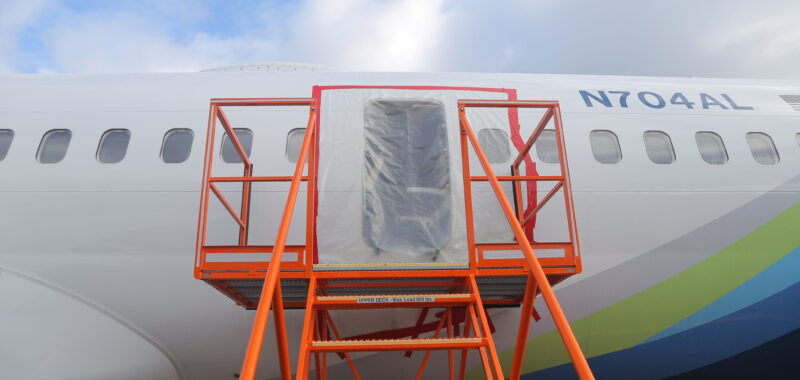Skift Take
NTSB Chair Jennifer Homendyâs comments come as the agency is hosting a two-day long series of hearings over what happened in the lead-up to the Alaska Airlines January 5 accident.
National Transportation Safety Board Jennifer Homendy criticized Boeing as a senior executive deflected a question at a hearing Tuesday about the companyâs practices before the January 5 Alaska Airlines blowout accident.Â
âThis isn’t a PR campaign for Boeing,â Homendy said. âWhat I want to know is what happened in March, April, May, June, July, August, September, leading up to what happened in January.â
Homendyâs comments come as Elizabeth Lund, the senior vice president of quality at Boeing Commercial Airplanes, focused more on the plane makerâs attempts to improve its quality control since the blowout.
Tuesday was the start of a two-day long series of hearings over the 737 Max 9, which will include testimony from pilots, flight attendants, members of Boeingâs International Association of Machinists and Aerospace Workers union, along with executives at the plane maker and Spirit Aerosystems.
A door plug that suddenly blew off an Alaska Airlines Max 9 on January 5, triggered a months-long investigation into Boeing and revived scrutiny into its production and quality control practices.
At the hearing, Lund said 737 Max production was still in the 20s per month and that the plane maker was working toward producing 38 a month. The Federal Aviation Administration placed a monthly cap on the production at 38 a month after the January 5 accident.
FAA chief Mike Whitaker told a Senate panel in June that the agency was âtoo hands offâ with Boeing before the blowout.
Terry George, a senior vice president and general manager of the Boeing program at Spirit Aerosystems, said at the Tuesday hearing that it now has far fewer workers with sheet metal experience.
Spirit shifted from a two-week training period to a six- to eight-week one, George said. Spirit Aerosystems, which Boeing is now set to acquire, assembled the fuselage that was involved in the Alaska accident.
Boeing and Spirit Workers Say They Feel Overworked
In a series of transcripts the NTSB released before the Tuesday hearing, multiple employees at Boeing and Spirit Aerosystems told the NTSB that the work could feel âstressfulâ or âoverwhelming.â
Michelle Delgado, a structures mechanic who worked as a contractor at Boeing, told the NTSB that personnel cuts at the plane maker led her to working 12- or 13-hour shifts.
âWhen we’re very overwhelmed with work, it is pressing because with everything, we’ve cut down on some personnel, so now it’s like in order for me to not have to deal with a worse situation tomorrow, I’d rather work a 12- to 13-hour shift to get it all done, for my sake, so I don’t have to deal with people the next day,â she said in the released testimony.
The team captain said there was also a high rate of turnover.
âWhat the company wants and what we have the skills and capabilities to perform at the time sometimes that doesn’t coincide,â a team captain for the 737 told the NTSB, âand so some people get disgruntled; they feel like they’re being overworked; they feel like, you know, that we might be getting taken advantage of.â
Airlines Sector Stock Index Performance Year-to-Date
What am I looking at? The performance of airline sector stocks within the ST200. The index includes companies publicly traded across global markets including network carriers, low-cost carriers, and other related companies.
The Skift Travel 200 (ST200) combines the financial performance of nearly 200 travel companies worth more than a trillion dollars into a single number. See more airlines sector financial performance.
Read the full methodology behind the Skift Travel 200.

